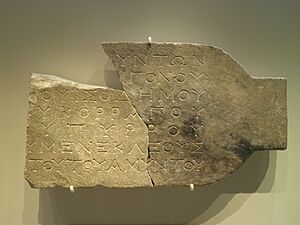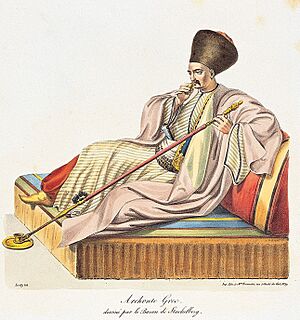Archon facts for kids
An Archon (pronounced ARK-on) is a Greek word meaning "ruler." It was often used as a title for important public officials in ancient times. The word comes from a Greek root meaning "to be first" or "to rule." You might recognize this root in words like "monarch" (a single ruler) or "hierarchy" (a system of ranking).
Contents
Ancient Greek Leaders: The Archons
In ancient Greece, especially in the early days, the main leaders of many city-states were called Archons. This title was also used more generally throughout Greek history. It could mean anything from a "club leader" to a "Roman governor."
Archons in Athens
In the famous city of Athens, a system of three main Archons developed. These three leaders were:
- The Archon Eponymos (pronounced eh-PON-ee-mos)
- The Polemarch (pronounced POL-eh-mark)
- The Archon Basileus (pronounced bah-SEE-leus)
At first, the power of the king in Athens slowly shifted to these Archons. They were chosen from the noble families through elections every ten years. During this time, the Archon Eponymos was the most important leader. The Polemarch was in charge of the army. The Archon Basileus handled religious duties for the city.
Changes Over Time
After 683 BC, Archons served for only one year. The year was even named after the Archon Eponymos, which helped keep track of time. Later, after 487 BC, Archons were chosen by drawing lots (like a lottery) from any citizen. The Polemarch's military duties were taken over by new generals called strategoi. From then on, the Polemarch only had small religious tasks. The Archon Eponymos remained the official head of state in the democracy, but their political power was much less.
Archons were also important for organizing big festivals in Athens. They would bring together poets, playwrights, actors, and wealthy citizens called choregoi (who paid for the shows). The Archon would choose three playwrights and assign each one a choregos. They also assigned the main actors for each play. The famous City Dionysia festival, where tragedy and comedy began, was managed by the Archon Eponymos.
Byzantine Empire: Rulers and Governors
In the Byzantine Empire, historians often called foreign rulers "Archons." For example, the leaders of the Bulgars sometimes used the title "Archon placed by God" in their Greek writings.
Inside Byzantium, "Archon" could mean any powerful noble. But it was also a specific title for certain provincial governors. In the 8th and 9th centuries, these Archons governed smaller, less central provinces like Dalmatia or Crete. Archons also managed naval bases, trade centers, and areas where Slavic people lived under Byzantine rule.
Later Uses and "Grand Archon"
From the 10th to 12th centuries, Archons were also governors of specific cities. The area an Archon ruled was called an archontia. The title was also given to people in charge of financial jobs, like the head of the mint (where coins are made).
The title megas archon (meaning "grand archon") also existed. It was sometimes used to translate foreign titles like "grand prince." In the mid-13th century, it became a special court rank for the highest-ranking official in the emperor's group. This title continued through the Palaiologan period, but it didn't have any specific duties.
Ottoman Empire: Local Greek Leaders
During the hundreds of years of Ottoman rule in Greece, Archons continued to play a role in city government. In Athens, for example, four Archons were chosen every two years by the citizens. They represented the Greek people in the city government and worked with the Islamic judge (called a Qadi). These Archons were usually chosen from the city's richest and most powerful families.
Archons of the Ecumenical Patriarchate of Constantinople
Today, the title of Archon is sometimes given to regular members of the Orthodox Church who have done great service for the Church's administration. This happens in communion with the Ecumenical Patriarch of Constantinople, who is a very important leader in the Orthodox Church.
In 1963, Archons in the United States formed a service group called the Order of St. Andrew. This Archon status is not part of the Church's official leadership ranks; it's purely an honorary title.
An Archon is honored by the Ecumenical Patriarch for their amazing service to the Church. They are usually well-known, respected leaders in the Orthodox Church. Their main promise is to protect and promote the Orthodox Christian faith and traditions. They also work to protect the Holy Patriarchate and its mission. Archons are also concerned with human rights and the well-being of the Church community.
Because it's a very important religious position, a candidate's faith and dedication are carefully checked. They must show a strong commitment to making the Church, their local parish, and the wider community better.
Other Uses of "Archon"
- In modern Greek, άρχοντας (archontas) is used in everyday talk for someone who has status or power.
- Arabic-speaking Copts (Christians in Egypt) use the word أرخن (urkhun) in church language for a leading member of the regular churchgoers.
- "Archon" was also a title for important officials in the Kingdom of Sicily.
- It can be used as a title in fraternities and sororities (social clubs).
- In Gnostic religious traditions, "Archon" often refers to a group of seven special beings. These beings are linked to the seven classical planets and are believed to have created the physical world.
- In the world of Software Engineering, "Archon" can refer to a group of architects (people who design software systems).
See also
- Exousiastes
Sources
- A Greek-English Lexicon (aka Liddell and Scott), ISBN: 0-19-864226-1
- The Oxford Companion to Classical Literature, ISBN: 0-19-866121-5.
- Archons of the Ecumenical Patriarchate
This contains a detailed account of the evolution of the Greek office, and the qualifications required. Authorities cited:
-
- G. Gilbert, Constitutional Antiquities (Eng. trans., 1895)
- Eduard Meyer's Geschichte des Alterthums, ii. sect. 228
- A. H. J. Greenidge, Handbook of Greek Constitutional History (1895)
- J. W. Headlam, On Election by Lot in Athens (Camb., 1891)
 | Chris Smalls |
 | Fred Hampton |
 | Ralph Abernathy |



